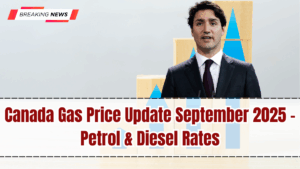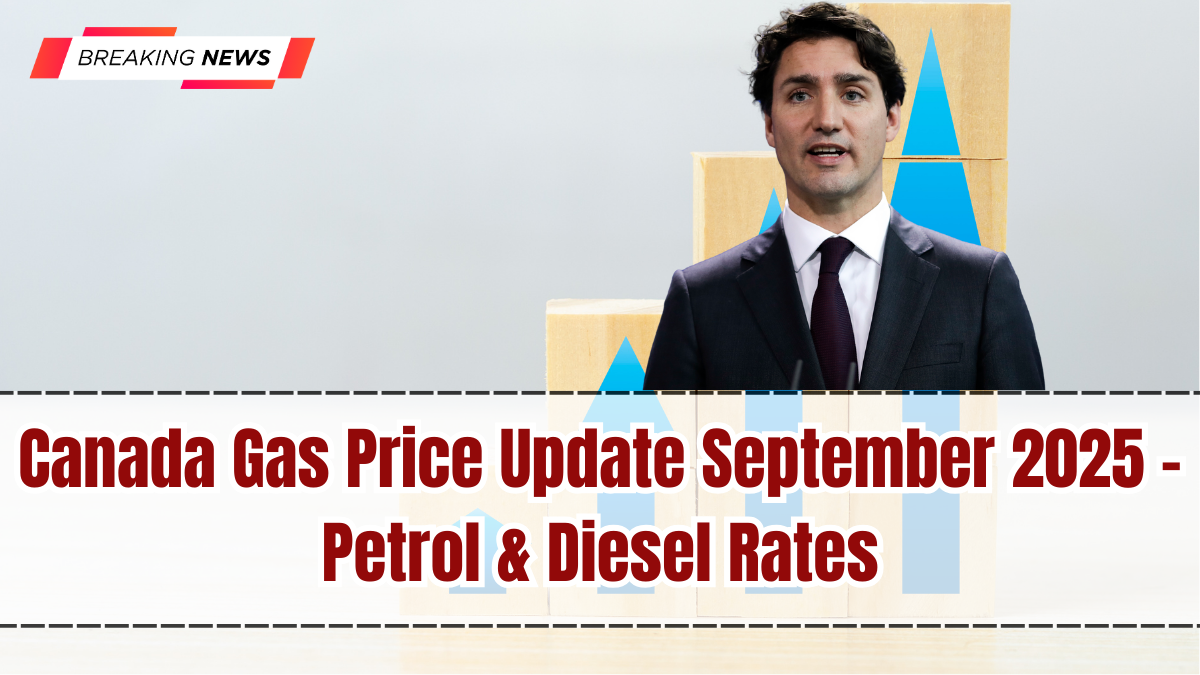The Canada Gas Prices September 2025 update is here, and drivers are once again feeling the pinch at the pump. Gasoline and diesel rates have risen across the country, with some provinces seeing record-high prices.
For households, transport operators, and businesses, these changes mean higher commuting costs and increased pressure on budgets. Since fuel is tied to everything from groceries to shipping, these price shifts affect more than just your car.
So, how much are Canadians paying for petrol and diesel in September 2025, and what’s behind the latest surge? Let’s break it down province by province.

What Are the Average Fuel Prices in September 2025?
According to national data, average rates this month are:
-
Gasoline (Petrol): $1.85–$2.05 per litre depending on province
-
Diesel: $1.95–$2.15 per litre, higher than petrol in most regions
While some provinces like Alberta enjoy lower averages, coastal cities and large metro areas continue to pay the highest rates.
Which Cities Have the Highest Gas Prices?
City-wise, the variation is striking.
-
Vancouver, BC: Around $2.10 per litre for petrol, among the highest in Canada
-
Toronto, Ontario: Roughly $1.95 per litre
-
Montreal, Quebec: Around $1.98 per litre
-
Calgary, Alberta: Cheaper at $1.75 per litre, thanks to local supply advantages
These differences are influenced by provincial taxes, distribution costs, and refinery capacity.
Why Are Fuel Prices Rising Again?
Several factors are pushing Canadian fuel prices higher this September.
-
Global Oil Prices: Brent crude remains near US$95–97 per barrel, the highest since 2023.
-
Carbon Taxes: Canada’s federal carbon tax increase earlier in 2025 continues to add pressure.
-
Seasonal Demand: End-of-summer travel and transport surges keep demand strong.
-
Exchange Rates: A weaker Canadian dollar makes imported fuel more expensive.
Together, these dynamics leave little relief for consumers.
How Do Prices Compare With Last Year?
In September 2024, petrol hovered around $1.70 per litre, while diesel averaged $1.80.
This year’s rates are roughly 8–12% higher, translating to hundreds of extra dollars per household annually. For truck operators, the difference is even more significant, raising logistics costs by thousands.
How Are Truckers and Businesses Impacted?
Diesel hikes hit hardest in the transport and farming sectors.
-
Logistics Firms: Delivery costs increase, pushing up prices of everyday goods.
-
Farmers: Higher diesel costs for machinery and transport raise food production expenses.
-
Small Businesses: Couriers, taxi drivers, and independent truckers see shrinking margins.
Industry groups are already urging the government to consider relief measures.
Are There Any Government Subsidies or Relief Plans?
Some provinces are exploring short-term relief.
-
Alberta: Considering suspending parts of its fuel tax temporarily.
-
Ontario & Quebec: Monitoring inflation impact but no direct subsidies yet.
-
Federal Government: Continues to defend carbon tax hikes as essential for climate goals.
So far, relief measures remain limited, leaving consumers to shoulder the cost.
How Can Drivers Save on Fuel in September 2025?
Canadians are adopting several strategies to cope.
-
Use fuel apps to find the cheapest stations nearby.
-
Drive efficiently—avoid speeding and unnecessary idling.
-
Carpool with coworkers or family where possible.
-
Consider public transport for daily commutes.
-
If feasible, explore hybrid or EV options for long-term savings.
Even small adjustments can save households hundreds each year.
Will Prices Keep Rising in the Coming Months?
Analysts suggest that volatility will continue.
If crude oil stays above US$95 per barrel, October could bring another round of increases. Winter demand for heating fuels may also keep prices elevated.
However, if the Canadian dollar strengthens or global demand eases, some relief could come before year-end.
Conclusion
The Canada Gas Prices September 2025 update reflects the difficult reality facing motorists nationwide. With petrol averaging close to $2 per litre and diesel even higher, households and businesses must adjust budgets and adopt fuel-saving habits.
Until global oil markets stabilize and domestic tax policies shift, Canadians will continue to feel the pressure at the pump. The challenge is not just about filling your tank—it’s about managing the ripple effects across the economy.
FAQs
How much is gasoline in Canada in September 2025?
Petrol averages $1.85–$2.05 per litre, depending on province.
Is diesel more expensive than petrol?
Yes. Diesel averages $1.95–$2.15 per litre, higher than petrol in most areas.
Why are Canadian fuel prices rising again?
Because of higher global oil prices, carbon taxes, strong demand, and a weaker Canadian dollar.
Which city has the highest fuel prices?
Vancouver, BC, where petrol averages $2.10 per litre.
Will prices drop later in 2025?
Unlikely in the short term. Prices may stay high until crude oil stabilizes or demand weakens.
Click here to know more.
